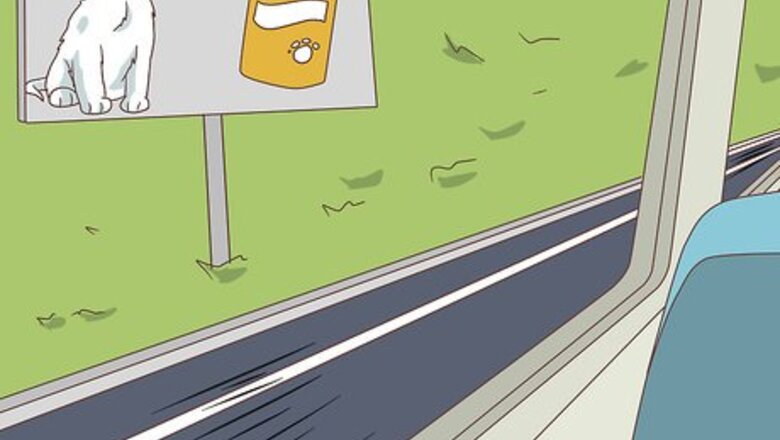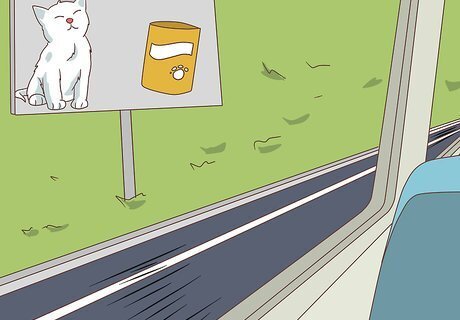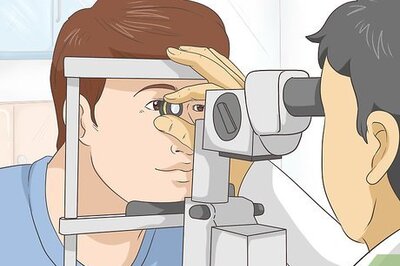
views
Having Fun on the Bus

Play road games. If you’re not allowed to bring electronic devices on your field trip, you can pass the time with road trip games that don’t require any accessories to play. Depending on the game, you’ll probably need at least one other person to play. However, you’ll have more fun if you get as many people involved as possible. In some cases, you may choose to play a game that the entire bus can participate in. If you want to keep it simple, play “20 Questions.” One person thinks of an object or person, and the other players ask questions, all the way up to 20, to try to figure out the answer. “Telephone” is a fun game for the entire bus. One person starts by whispering a sentence or two to another person, who then tries to repeat it verbatim to a third person -- and so on. The final person says the phrase out loud, so everyone can hear how close it is to what the original person said. When you’re driving a highway, you can play the “Restaurant/Gas Station/Hotel” game. All the players choose a specific restaurant, gas station, or hotel, such as McDonald’s or Burger King, and you earn a point every time you see the place you’ve chosen or its logo on a road sign. The person with the most points at the end of the allotted time wins.

Start a sing-along. Another fun way to pass the time and involve the entire bus is to sing some bus songs. You can go around the bus and have everyone start a song to get a good variety of music. In some cases, it can be fun to choose a theme, such as songs about driving, Disney songs, or songs with "trip" in the title. It's usually best to use current pop songs that most people would know, so no one feels left out. If you have a school song, you might end or start the sing along with that.

Chat with friends. On a short bus ride, you may not necessarily need a book or electronic device to entertain you. Instead, you can pass the time talking to your friends and catching up on what’s going on with them. If you’re not sitting near your friends and are sharing a seat with someone who you don’t know very well, take the opportunity to get to know your fellow student a little better. If you’re not sure what to talk about, consider having a conversation about the field trip and what you expect to see and do during the day.

Bring entertainment. If your field trip destination is a significant distance from school, you’ll have to sit through a long bus ride. That’s why it’s a good idea to bring something to entertain yourself, so time passes a little more quickly. If you bring your phone or tablet, you may be able to listen to music or play games. You might prefer to bring a book or some magazines that you can share with friends. Make sure to ask your teacher if you’re allowed to bring your phone, tablet, or other electronic devices before the trip. You don’t want to count on your device to entertain you, only to have your teacher confiscate it when you get on the bus.
Getting Ready for the Trip

Do the preparatory work. In some cases, your teacher may give you an assignment before the trip to help prepare for the activities or exhibits that you will see at the venue. They may assign reading or ask you to do research on a related topic. Make sure that you’ve completed the assignment before you leave the trip, so you know that you’re fully prepared to take in everything that you’ll experience on the trip. If you don’t understand something that you read or research as part of your pre-trip assignment, ask your teacher for clarification. You don’t want to go on the trip feeling confused.

Plan the right outfit. To ensure that you have a good time on your field trip, it’s important to choose appropriate clothing. Your teacher may include outfit recommendations or guideline in the materials about the trip, so be sure to read them carefully. In some cases, all the students may be required to wear the same color shirt, so it’s easier to keep track of everyone on the trip. Field trips often involve a great deal of walking, so be sure to wear comfortable shoes, such as tennis shoes or sneakers. For an outdoor field trip, make sure that you’re dressed appropriately for the weather. That means wearing a raincoat and boots in rain, and a warm jacket or coat for cold weather. In the heat, shorts and a t-shirt can help you cool. If the venue is indoors, you don’t have to worry about the weather. However, you may want to bring a light sweater in case the air conditioning is very strong. Some field trips may require more formal attire. For example, if you’re attending a play or concert, jeans and sneakers may not be appropriate. Ask your teacher if you’re not sure what to wear.

Pack the appropriate items. Depending on where you are going, you may need to bring certain accessories on the trip. The information that your teacher provides should contain a list of necessary items, so read carefully. In general, you may want to have a notebook or pad and pen to take notes. Make sure that you take any medical supplies that you might need, such as medication, an inhaler, or an EpiPen, in case of an emergency. You may want to have a little money on you in case the trip venue has a gift shop or you want to buy a drink or snack. If you’re going to be outdoors all day, don’t forget to pack sunscreen so you can reapply as necessary.

Make lunch plans. Most field trips keep you away from school all day, so you’ll probably eat lunch at the venue. Some locations may have a cafeteria or snack bar where you can purchase food, while others do not. Your teacher will inform you of the food situation, so you can decide whether to pack a lunch or bring money to buy a meal. If you are packing a lunch for warm weather, you may want to include cold packs to ensure that your food doesn’t spoil. You may want to pack an extra bottle of water, juice, or your favorite beverage to ensure that you stay hydrated throughout the trip.
Behaving on the Trip

Follow the rules. The most important thing that you can do to ensure that you enjoy a field trip is to obey the rules. You don’t want to be yelled at or pulled out of the field trip for behaving badly because you may miss out on fun, interesting activities. Your teacher will likely go over the rules before you leave for the trip, but make sure to listen to the guidelines that staff at your destination, such as a museum tour guide, share as well. Remember that you’re representing your entire school when you’re on a field trip, so it’s important to behave and establish a good reputation for the school. If you and other students break rules and are generally unruly, not only may your school not be invited back to the venue, but your class may not be able to go on any field trips in the future. Don’t be afraid to ask questions if you’re unsure of the rules. You don’t want to accidentally break a rule because you don’t understand what is and is not permitted.

Pay attention. Before you arrive at the field trip destination, your teacher has probably given you a background lesson on the subject matter. The venue usually helps bring the lesson to life in a fun, interesting way that it couldn’t in a classroom, though, so it’s important to pay attention to the activities and presentations that occur during the field trip so you really absorb the information. It’s always exciting to be out of school, but you shouldn’t just use the opportunity to chat with your friends. You’re still supposed to learn something even though you’re out of the classroom. If you have friends who have a habit of distracting you, it’s a good idea to tell them that you really want to pay attention on the trip. You might say, “I really like talking/hanging out with you, but let’s save that for lunch. I really want to pay attention today.”

Be open-minded. When you hear where you’re going on your field trip, you might write the experience off as boring because it’s tied to a lesson that you’ve learned in school. However, you should go into the trip with an open mind because getting to experience the lesson out in the field is often much more interesting than simply reading a book or listening to a lecture. Be receptive to whatever you may experience on the field trip, so you really get the most out of it. For example, if you’ve read a Shakespearean play in class and are going to see a production of it, you might assume you’ll be bored because you didn’t enjoy reading it. However, a life performance can often bring the story and characters to life in a powerful way, so you may actually enjoy the play. If your field trip is to a venue that you’ve been to before, such as a zoo, and you feel like the exhibits are all things that you’ve seen before, try to consider the location from a new perspective. Don’t just study the animals at the zoo; think about what it would like to be a zoologist or veterinarian to help you see the venue in a new way.

Consult worksheets. Your teacher may give you worksheets that they want you to complete after the trip. You don’t necessarily have to fill them out while you’re actually on the field trip, but it’s a good idea to at least read them over at the start. That will help you know what things you should keep an eye out for during the trip, and help ensure that you get the most out of the experience. If your teacher hasn’t provided worksheets, there may still be some type of follow-up assignment after the trip, such as an essay. You may want to bring a small notebook or pad with you so you can jot down some notes as you go.

Find a friend to buddy up with. When you're on a field trip to a place that you've never been before, it can be easy to get lost. If you pair up with a friend, you two can look out for each other. You'll notice if your buddy wanders off, and they'll notice if you do. That way, you can get help for one another if it's necessary. Knowing you're responsible for someone else can also help you become more aware of your surroundings. If you don't have a good friend on the trip, look for someone else who's in a similar situation and pair up with them.
















Comments
0 comment